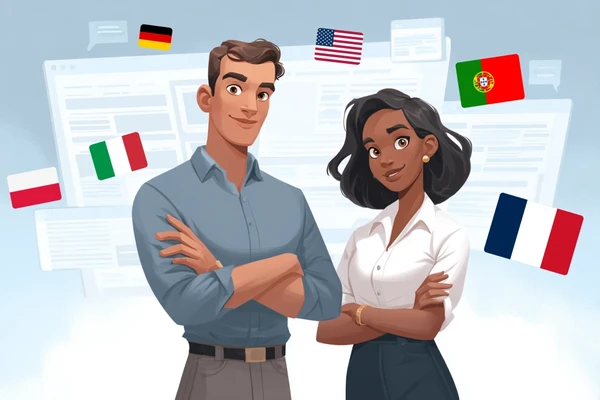Step into a realm where AI-powered search engines and human ingenuity converge. The search engine landscape is undergoing a remarkable transformation, revolutionizing the way we explore and discover information. From AI-generated answers to immersive search experiences, let’s together uncover the latest advancements that are reshaping the very fabric of search!
Let's start!
🔮 The way people search for information is changing, from treating TikTok as a search engine to generating answers in ChatGPT,
🔮 Google incorporates AI-generated answers into search results, also changing the perception of AI-created content,
🔮Bing Chat, powered by ChatGPT and integrated into Microsoft's Edge browser and Bing search engine, redefines the search experience,
🔮 Google Bard arrives as a dynamic alternative to Bing Chat, reimagining the way users interact with and search for information.
🔮 Google unveils Gemini, their most sophisticated AI model yet, setting a new benchmark in advanced technology.
🔮The future of search engines lies in a harmonious integration of human creativity and AI advancements, guiding users through a realm of knowledge.
Search engine landscape as we know it is about to end…
Let’s shed light on an imminent paradigm shift that is set to revolutionize the search engine landscape as we know it. With the advent of ChatGPT and the AI revolution, we find ourselves on the cusp of a transformational era, where search engines are becoming smarter, more intuitive, and capable of understanding the nuances of human language like never before.
But let’s pause for a moment, AI topic. Did you hear how loud was a couple of months ago about TikTok being a new search engine? Or did you hear about this joke? They say if you seek real answers to your questions, you should turn to Reddit, not Google. While it may sound like a jest, it carries a grain of truth. Reddit, with its vibrant communities and diverse perspectives, has become a hotbed of authentic, unfiltered information. It serves as a testament to the evolving landscape of search, where people yearn for more than just algorithmic responses—a place where real voices share genuine insights.
People are searching for answers in a new form
And this has been going on for a while…
A black horse among giants
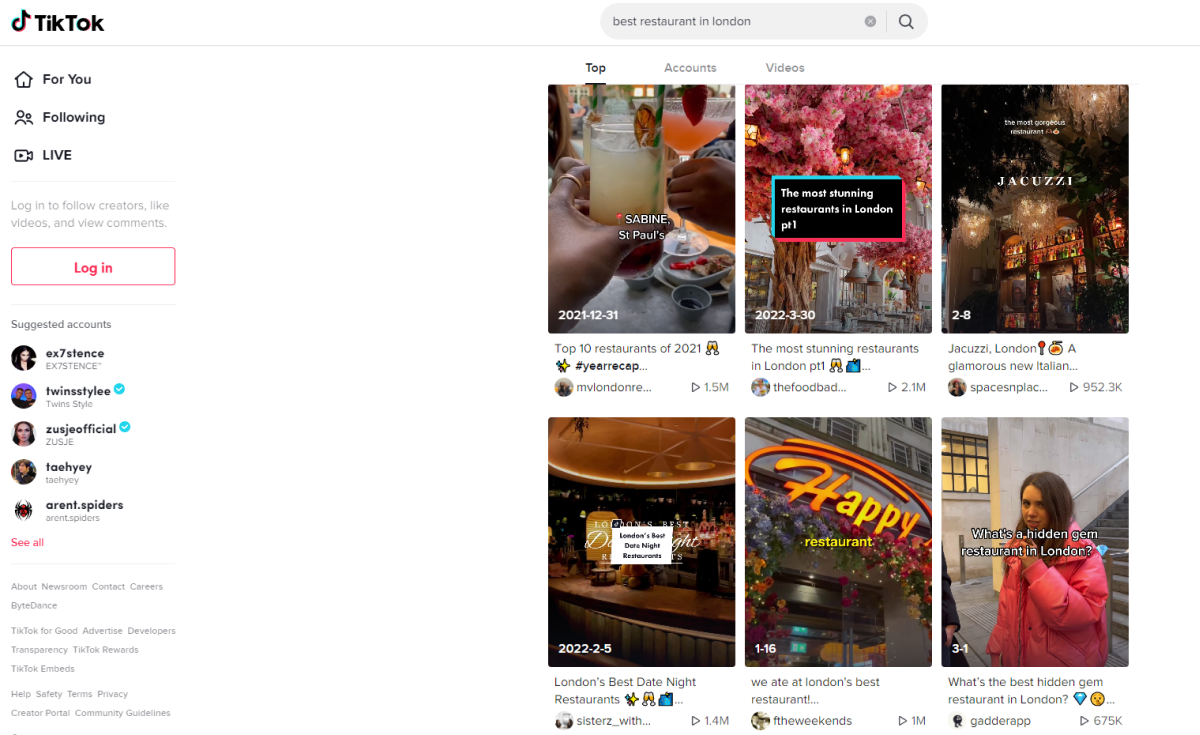
TikTok search on keyword "best restaurant in london"
Even before all this noise about ChatGPT started, something shifted in the way people search for… many things, apparently. As I mentioned before, at the end of 2022, there was ground-breaking information about how some people found a better search engine, even better than Google. And yes, it was a Tik Tok platform known for captivating short videos that had unwittingly become a hub for seeking information, igniting a paradigm shift in the search landscape. According to Pew Research Center, nearly 40% of Generation Z people just prefer Tik Tok for online searches, among other options.
TikTok's allure as a search engine lies in its ability to captivate and inform users through bite-sized, engaging content. People are flocking to the platform not only for entertainment but also to discover quick answers and explore diverse topics. With each swipe, a user unravels a tapestry of knowledge presented in an innovative and immersive format, revolutionizing the search experience.
The immense popularity of TikTok in the context of a search engine caused quite a stir, but at that time, we didn’t yet expect the grand entrance of ChatGPT.
Is a friendly chit-chat getting too serious?
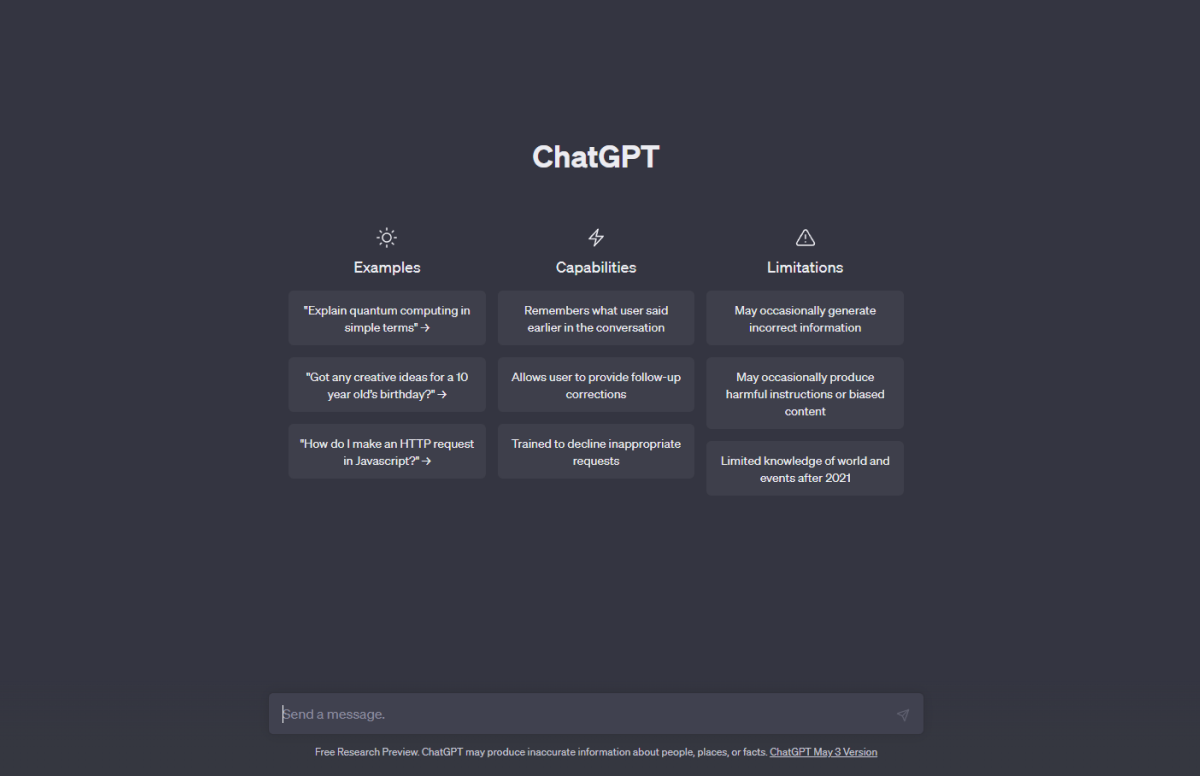
ChatGPT's main dashboard
Imagine a search engine that engages in a conversation with you, understands your intent, and provides accurate answers in a manner that feels like you're talking to a knowledgeable friend. This is precisely what ChatGPT, powered by OpenAI, brings to the table. It can comprehend the context, subtext, and even the implied meanings behind our queries, leading to more personalized and relevant search results. Users can engage in natural conversations, asking follow-up questions, and clarifications, and receive detailed explanations from the search engine itself.
When ChatGPT first came around, it couldn't tap into the latest info on the web, which was a bit of a downer. But things have changed, and now it's got access to up-to-date info from the web. However, it's not all smooth sailing. There are a couple of things we need to watch out for.
The thing is, ChatGPT learns from what we feed it, kind of like teaching a friend new stuff. But sometimes, it's a bit like a magic trick – you get an answer, but you don't really know where it came from (sometimes you get a link to the source, but in most cases you don’t know where the information was obtained and how valuable it is). That's a bit of a puzzle, right? It's tough to trust an answer when you don't know its roots.
So, calling ChatGPT a full-on search engine? That's a stretch… unless you will team it up with some big player like Google or Bing. That's something to get excited about, isn't it?
Killer ChatGPT SEO Prompts For Maximum Impact
The return of old-new player to the game
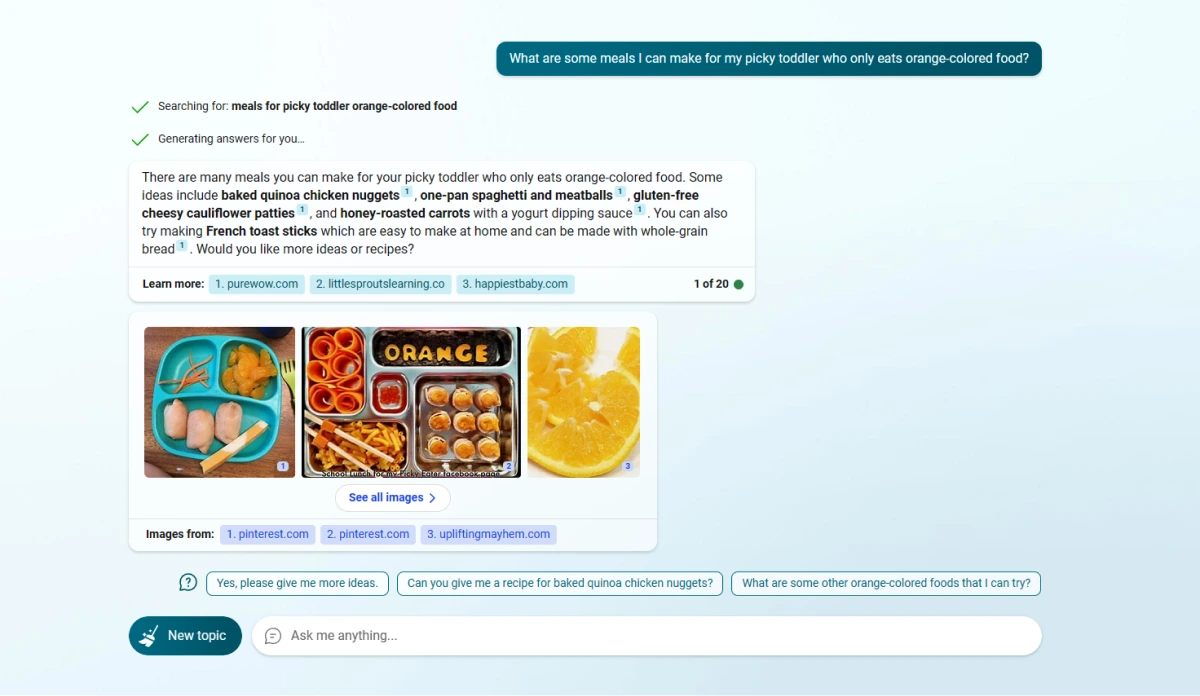
Search in Bing Chat
Microsoft decided to seize the opportunity and, with the explosion of the AI boom, presented its own solution. Bing Chat, Microsoft's AI-powered search engine integration, is based on the same technology as ChatGPT. With Bing Chat, Microsoft seeks to redefine the search experience by seamlessly blending generative AI directly into its Edge web browser and Bing search engine.
Microsoft's commitment to user accessibility is evident in the effortless integration of Bing Chat into the browsing experience and its other products. Now you don't have to go directly into the search engine to use Bing Chat, now you can even use it while chatting on Skype! This marks a significant shift in how we interact with search technology and people like it! Microsoft got about 1 million new Bing users from its preview version, crossing that way a bigger milestone - 100 million active users of Bing.
It's an exciting (and a little scary) time to be a part of the search engine revolution, where technology and human curiosity converge, propelling us into a world where answers are no longer static but dynamic, interactive, and ever-evolving.
A fight of giants - Google vs. Microsoft
.webp?649771.2000000477)
Screenshot of Google Bard
Google and Microsoft are in a big race to be the best in AI and search engines. Google has a new tool called Bard, which is their way of jumping into the world of smart chatbots, like ChatGPT.
What's Bard all about?
What can Bard do?
Bard is like a smart friend you can chat with. You can ask it to do things like:
- Explain hard stuff in easy ways.
- Help you come up with ideas for stories or projects.
- Create an article outline.
- Help you figure out your to-do list.
- Answer fun or complicated questions.
How does Bard work?
When you talk to Bard, it uses what it has learned from reading lots of stuff to give you a good answer. It's always getting better because it learns from the questions people ask and the feedback they give.
One neat thing about Bard is that it can show you pictures along with answers. What’s more, there is a cool feature that allows you to double-check Bard's responses or learn more about them with Google Search. Also, for answers with links or pictures, you can easily see and visit the source.
As you can see, Google Bard and Bing Chat have a lot of similarities, but also they have different sets of interesting features that make them suitable for different needs.
The AI revolution - destroyer or lifesaver of the search engine landscape?
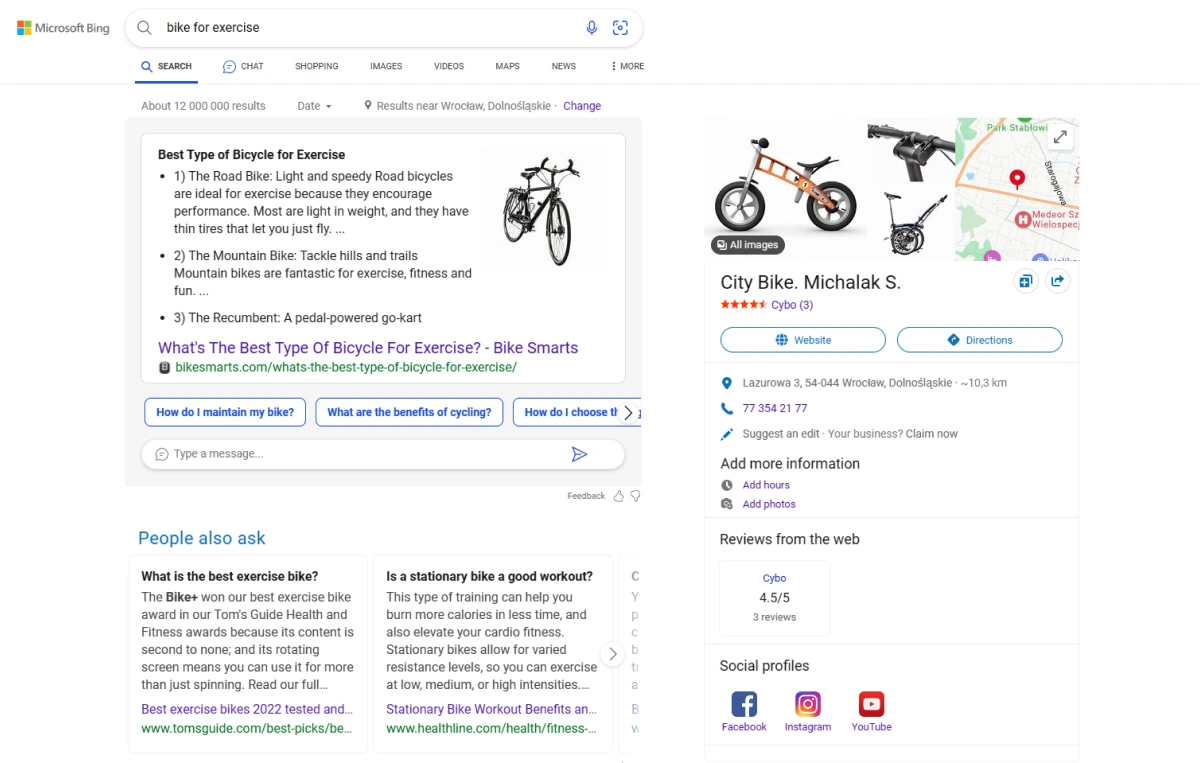
Bing search with AI-generated results
As we stand on the precipice of the AI revolution, a question lingers in the air: Will this technological marvel be the destroyer or lifesaver of the search engine landscape? The launch of ChatGPT, powered by OpenAI, has already demonstrated the immense potential of AI in transforming the search experience. However, we must tread carefully and consider the implications of this revolution.
Imagine AI as a double-edged sword, capable of both disrupting and enhancing the search engine landscape. On the one hand, there is a fear that AI might overshadow the human element, rendering search engines impersonal and devoid of human touch. Critics argue that the growing popularity of platforms like TikTok as search engines further distances us from traditional search engines, raising concerns about the relevance and future of these established players.
However, it is crucial to recognize the lifesaving potential of AI. ChatGPT, for instance, has shown us how AI can empower search engines to understand and engage in natural conversations, delivering personalized and relevant results. AI has the ability to decipher complex queries, comprehend context, and adapt to individual preferences, revolutionizing the way we search for information. It has the potential to amplify human capabilities and bridge the gap between technology and human understanding.
AI-driven search engines bring a new level of efficiency and convenience. They can process vast amounts of data, identify patterns, and make connections that might have eluded traditional algorithms. This allows for more accurate and comprehensive search results, saving users time and effort. Additionally, AI can learn and adapt, continuously improving its understanding of user intent and delivering increasingly refined responses.
Get started
No coding experience required.
The AI revolution also brings opportunities for businesses. With AI-powered search engines, businesses can tap into a wealth of insights, understand customer preferences at a deeper level, and optimize their strategies accordingly. AI-driven personalization enables businesses to deliver tailored experiences, fostering stronger connections with their audience and driving growth.
To harness the true potential of the AI revolution in the search engine landscape, we must strike a delicate balance. We need to ensure that AI augments human intelligence rather than replacing it. It should serve as a powerful tool that amplifies our abilities, making search engines more intuitive, personalized, and efficient. By embracing this technological leap and leveraging AI to enhance the search experience, we can navigate the evolving landscape and deliver profound value to users and businesses alike.
But wait! Where in all that is the place for humans and human-created content?
As we venture into the era of advanced AI technologies in search engine experiences, questions arise about the place of human-created content and the responsibility that comes with harnessing the power of AI. Already these issues have been raised in terms of using ChatGPT to create texts or Midjourney to generate images. Because in that case, who is the author of such creations? Based on what sources are they created? How do you even recognize AI-generated content?

AI-generated photo with a special tag
In light of the news about the Google AI search engine's new features, these questions are getting even more critical. The company itself assures that it has them all in mind and is working to find answers to each of them. The first action in this topic is healthier linking to publishers or the introduction of AI-generated image labels.
In the new Google AI, the company plans to highlight the importance of linking to publishers and supporting the ecosystem. By prominently displaying specific websites within the generated answers, users are encouraged to explore the sources further. This approach fosters transparency and recognizes the value of human-created content.
A similar case is when it comes to AI-generated images. Site owners and publishers will have the opportunity to manually label their images as AI-generated, providing users with transparency and context. By distinguishing between AI-generated and human-created images, Google aims to enhance information literacy and promote awareness of the creative processes involved. This marks an essential step toward AI responsibility and accountability in the visual realm.
Even the EU Commision noticed coming problems from enormous popularity and growth of AI technology. So, they had a big meeting and agreed on some new rules called the Artificial Intelligence Act. This act is like a big set of guidelines to make sure AI is safe and respects our rights while also encouraging new ideas and investments in Europe.
Here's what's happening:
- They're setting stricter rules for the most powerful AI systems that could really change things.
- Some uses of AI aren't good, like spying on people or tricking them, so those will be banned.
- The police might need to use AI to help them do their jobs, but they'll have special rules to follow to make sure they use it right.
- Before any risky AI is used, people have to check to make sure it won't harm people's rights.
- They want to make it easier for people with new ideas to test and develop their AI without too much hassle.
- If someone doesn't follow the rules, they could have to pay a lot of money.
These rules aren't final yet. They still need some work and then everyone has to agree on them. Once that's done, they should be out around 2025/2026.
Soo.. what now? What can we expect from the coming new generation of search engine experiences?
As the search engine landscape continues to evolve, a new generation of search engine experiences is on the horizon. At its annual conference - Google I/O, the company announced several changes that are being made to its search engine in light of happening developments.
The most significant change, somewhat expected but still causing a lot of excitement, is the introduction of AI-generated searches into search results. Let’s quickly go through Google I/O summary in case of search engine landscape🚀
1. Search Generative Experience in Google Search Lab
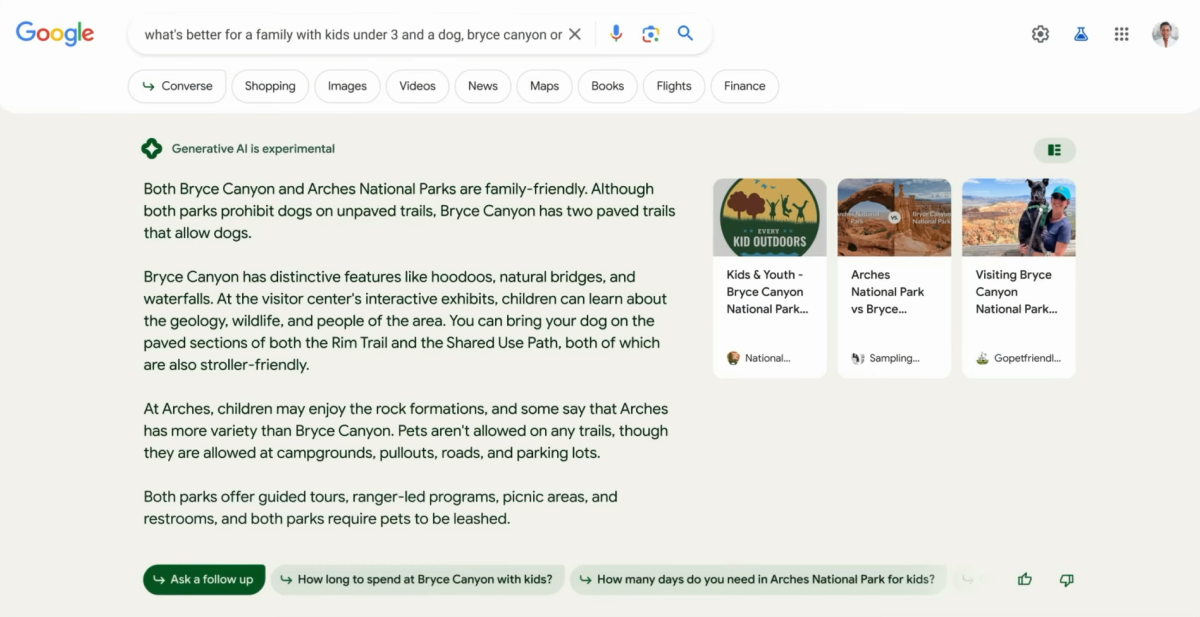
An example of an AI-generated response in a Google search engine
The home page of your wedding website is the first impression that your guests will have. It's essential to make sure that it's visually appealing and informative. You can add here your couple's photo as a big banner or day counter to your special day.
The new Google Search Generative Experience is set to transform the way users interact with search results. With the integration of AI-generated answers appearing above the search results listings, Google aims to provide users with more comprehensive and relevant information. These AI-generated answers are clearly labeled as experimental, with Google citing the websites used to generate the answer. They will be in a box accompanied by clickable websites that were referenced in the answer so that users can click and check the source.
In the new search experience, there will be something that we know from ChatGPT - conversational mode. You can do this by adding more information in the "Ask a follow-up" box. After this, you will get follow-up answers.
By leveraging AI-generated answers, users can access more comprehensive information, explore sources, and engage in conversational interactions. With a focus on user safety and reliable information, Google aims to enhance the search experience while upholding the integrity of search results.
2. AI-responsible approach
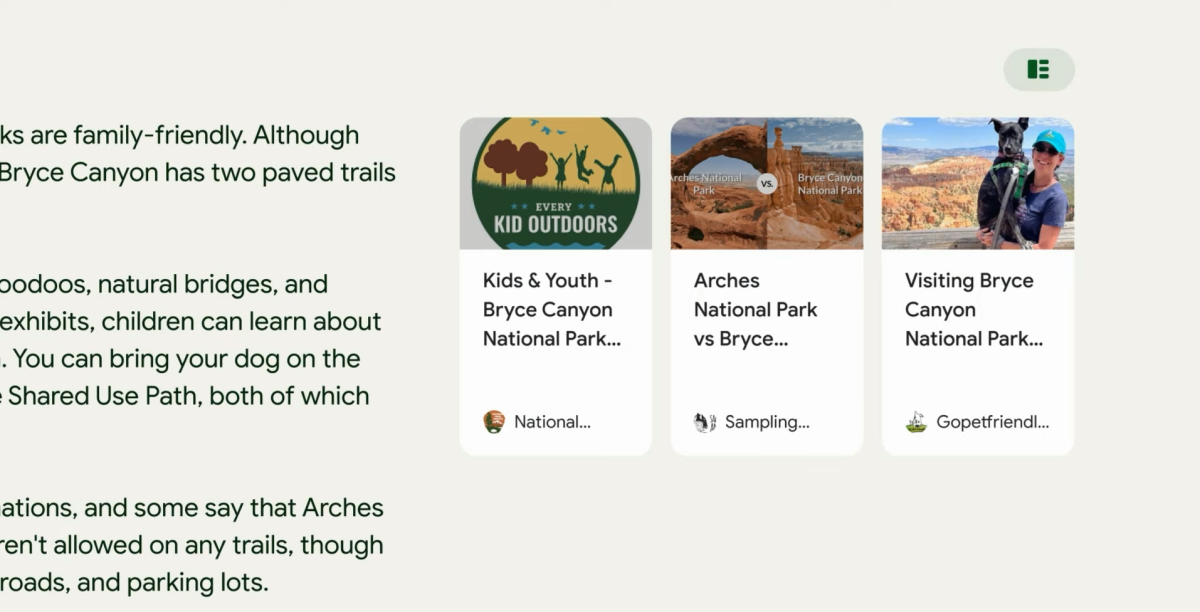
An example of an AI-generated Google response with tagged sources
As we discussed before - a lot is going on regarding creating a whole experience with the use of AI that will be safe and under control. Google's approach to the new generation of search experiences also emphasizes this issue.
No more answers without provided sources, the AI-powered responses will be curated from a variety of trustworthy sources when displaying the websites that contribute to AI-generated answers.
Users will have the opportunity to click on these websites, explore additional details, and gain a comprehensive understanding of the topic at hand. It's akin to embarking on an intellectual journey, with search engines serving as reliable guides to a realm of knowledge.
This is good news for content creators who were afraid that their content would be used without their knowledge and that the responses generated directly in search results without source, would take traffic away from their website.
What’s more - finally, there is a sign of the first regulation of the use of AI in the case of visual creation. Now if someone generates an image in Midjourney and, for example, puts it on their site, will have a chance to use special tags to indicate, the source of its creation.
3. Google Shopping Graph

An example of an AI-generated response on Google in the context of shopping
Imagine a search engine that not only provides product listings but also offers a comprehensive snapshot of noteworthy factors to consider, up-to-date reviews, ratings, prices, and more. With this game-changing integration of generative AI in Search, Google aims to transform the way we shop, making complex purchase decisions faster, easier, and more informed than ever before.
Think of it as a dynamic tapestry that captures the ever-changing landscape of products, sellers, brands, reviews, and inventory. Every hour, more than 1.8 billion listings are refreshed within the Shopping Graph, ensuring users receive the freshest and most reliable results available. This comprehensive and constantly evolving dataset forms the backbone of Google's generative AI shopping experience.
The dynamic nature of the Shopping Graph ensures that users receive fresh and reliable results with each search. As product listings evolve and sellers update their inventories, Google's AI algorithms continuously update the Shopping Graph to reflect the latest information. This commitment to real-time data and accuracy enables users to shop confidently, knowing that the information at their fingertips is up-to-date and trustworthy.
Get started
No coding experience required.
4. Perspectives in Search
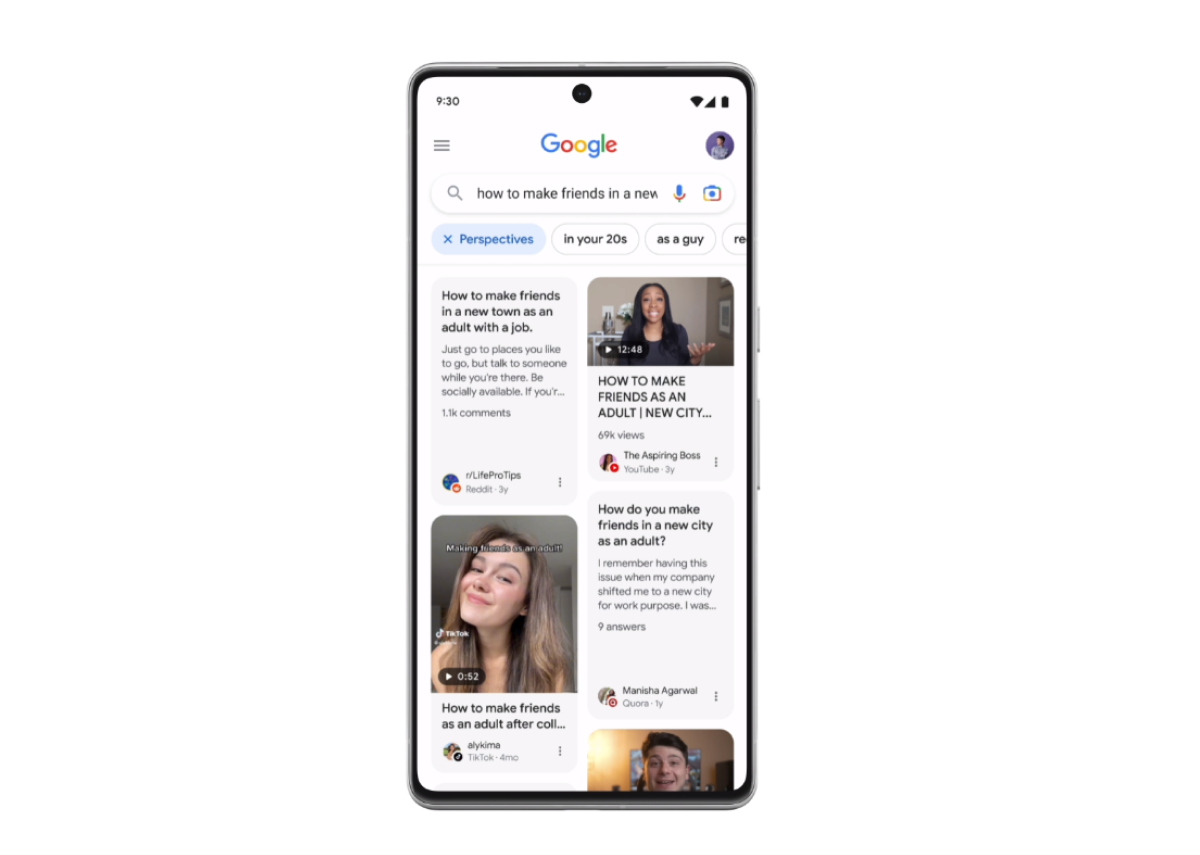
An example of a generated Google response with a Perspectives filter
With the introduction of the Perspectives filter, search results are set to undergo a profound transformation. This innovative feature enables users to explore firsthand exclusively and expert insights from forums, social media platforms, and video-sharing communities. As the search engine landscape continues to evolve, Google's commitment to providing a comprehensive and inclusive search experience is evident.
With the Perspectives filter, users gain access to a wealth of invaluable information shared through long- and short-form videos, images, and written posts. By tapping into discussion boards, Q&A sites, and social media platforms, users are exposed to personal stories, insightful tips, and engaging conversations from individuals who have walked the path before them. The filter acts as a gateway to a world of diverse perspectives, opening new avenues of knowledge and understanding.
5. Gemini - AI model
.webp?1268257.2000000477)
Example of use of Gemini from Google
Gemini isn't just any AI; it's like a universal translator for all kinds of information, including text, code, audio, images, and videos. Imagine an AI that doesn't just understand words but can also make sense of a picture, interpret a piece of music, or analyze a video.
What's really cool about Gemini is that it's super adaptable. Whether you're using a massive data center or just your smartphone, Gemini can run efficiently on all sorts of devices. This flexibility is a big deal for developers and businesses looking to integrate AI into their work without worrying about hardware limitations.
Gemini comes in three flavors: Gemini Ultra, Gemini Pro, and Gemini Nano. Each version is tailored to different needs, but let's talk about the star of the show: Gemini Ultra. This powerhouse has blown past the competition in 30 out of 32 academic benchmarks that test how smart and capable large language models are. That's like entering a marathon and leaving everyone else in the dust.
One of the most impressive feats of Gemini Ultra is scoring 90.0% on the MMLU test. This is the first time an AI has outperformed human experts in a test that covers a wide range of subjects, from math and physics to history and law. It's not just about knowing facts; it's about understanding complex problems and coming up with solutions.
So, what can Gemini do for you?
- make sense of complicated stuff,
- explain the code but also generate code in popular languages like Python, Java, C++, and Go.
- answer questions relating to complicated topics,
- generate text and images (or both at once).
The best part? Accessing Gemini is as easy as using Google products like Bard or Pixels. It's designed to be user-friendly and accessible to be able to try out by everyone.
Let’s get ready for the coming changes!
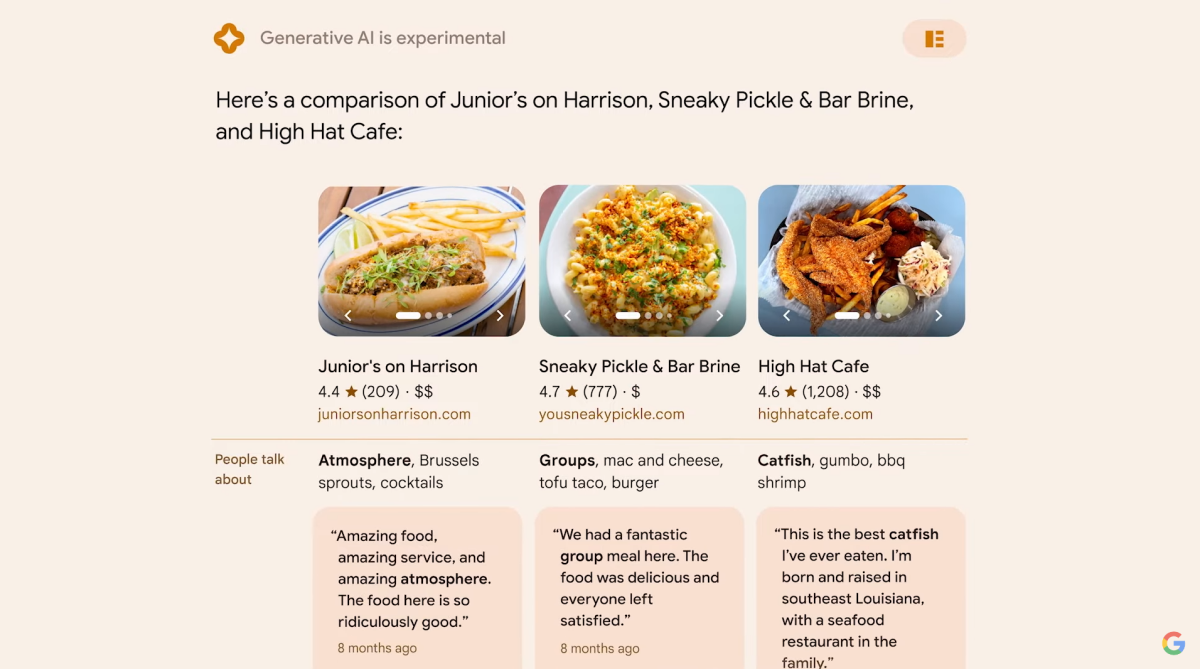
An example of a generated response from Google AI
But… you can ask, “How can we prepare for something that we don’t know exactly how it will look and what kind of impact it will have?” It’s a good question, and of course, I don’t have the perfect answer for it. None have it. But through observing unfolding changes, we can predict a few coming changes.
🔮 Come to terms with the fact that AI is here to stay. Get over it! Instead of despairing or dreading the coming changes, start growing! Lots of great AI tools have been developed in recent months, and many have already learned to use them effectively. If you haven't started developing your AI skills yet, it's about time to start doing so.
🔮 Stay up to date. I don't think I need to convince you that changes in AI, ChatGPT, SEO, and everything else happening around us are happening scarily fast.
🔮 Be calm. Don't panic when looking at the ongoing changes. Focus on what you have been doing so far. If you've been creating great content full of your unique knowledge and experience, keep doing it. Content marketing or SEO are not going away, sure they may require new solutions, but it's something completely normal, something you can adapt to.
In this era of dynamic search evolution, we find ourselves witnessing a profound transformation in the way people seek answers. It all depends on you how you will use it and redirect it to your own success!
Let's start!
The AI revolution is search - FAQ
What is Google Search Lab?
Google Search Labs is a platform where users can sign up to test and provide feedback on bold new products and ideas being explored by Google. It allows users to engage in early-stage experiments and contribute directly to the development of new search experiences.
How do I access Google Search Labs?
To access Google Search Labs, users can sign up through the designated platform or program offered by Google. Details on how to participate and access Search Labs will be provided by Google through official channels.
What is Google IO?
Google IO is an annual developer conference hosted by Google. It serves as a platform for Google to announce and showcase new technologies, products, and updates across various Google platforms, including search. It provides developers and the wider tech community with insights, workshops, and demonstrations of upcoming innovations from Google.
What was announced at Google IO 2023?
At Google IO 2023, several exciting announcements were made. Google introduced Search Labs, a platform where users can sign up and test new products and ideas being explored by Google. They also unveiled a new generative AI experience in Search, allowing users to receive AI-powered snapshots of key information with links to explore further. Additionally, a Perspectives filter was announced, enabling users to exclusively view firsthand or expert information from forums, social media sites, and video-sharing communities. Bard, Google's experiment in collaboration with generative AI, received improvements such as Dark theme and expanded language support, including Japanese and Korean.
How to use Bard AI?
To use Bard AI, follow these simple steps:
1. Go to bard.google.com in your web browser.
2. Sign in to your Google Account if you haven't already.
3. In the text box at the bottom of the page, enter your question, prompt, or topic you want to explore.
4. Click on the "Submit" button to start the conversation with Bard.
How do you access Google Bard?
To use Bard, you need a personal Google Account or a Google Workspace account with Bard access enabled by your administrator. You can use Bard to brainstorm ideas, develop plans, generate summaries, and create drafts of various content such as emails, blog posts, poems, and more. Ensure you are using a supported browser such as Chrome, Safari, Firefox, Opera, or Edgium. Note that Bard is gradually being made available to other countries.
What can you do in Bard?
Bard AI can assist you in various ways, such as:
1. Brainstorm ideas and develop plans.
2. Finding different approaches to accomplish tasks.
3. Obtaining quick and easy-to-understand summaries of complex topics.
4. Creating initial drafts of outlines, emails, blog posts, poems, and more.

Karol is a serial entrepreneur, e-commerce speaker m.in for the World Bank, and founder of 3 startups, as part of which he has advised several hundred companies. He was also responsible for projects of the largest financial institutions in Europe, with the smallest project being worth over €50 million.
He has two master's degrees, one in Computer Science and the other in Marketing Management, obtained during his studies in Poland and Portugal. He gained experience in Silicon Valley and while running companies in many countries, including Poland, Portugal, the United States, and Great Britain. For over ten years, he has been helping startups, financial institutions, small and medium-sized enterprises to improve their functioning through digitization.


